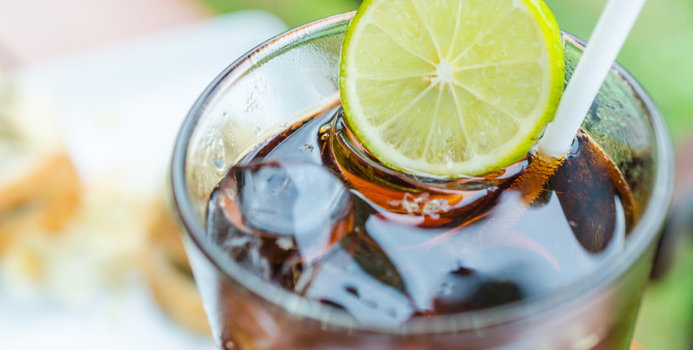Frequently people reach for diet soda as a calorie-conscious choice. In a 20-ounce bottle of regular soda, you are going to consume 240 calories or 12% of the average person's daily calorie needs while providing no nutritional value besides carbohydrates. Energy drinks, smoothies and coffee drinks can often provide even more added sugar and calories. So often to fill the craving for a sweet or carbonated drink, people choose diet soda, but there are some negatives to drinking diet soda.
1. Weight Gain
Although often diet soda is thought of as a weight conscious choice, several studies have shown evidence to the contrary. Diet soda drinkers still seemed to suffer the same consequences as those who choose regular soda, including issues like weight gain, cardiovascular disease, stroke and type 2 diabetes. Some of these studies further speculate that the consumption of artificial sweeteners may cause derangements in metabolic processes, such as interfering with the body's normal responses to using glucose for energy homeostasis. Another study in the July 2012 journal of Behavioral Brain Research found that rats given saccharin, which is found in many diet sodas, saw differences in both blood glucose and GLP-1 suggesting exposure to high-intensity sweeteners results in change in glucose homeostasis and reduces satiety.
2. Diabetes
Artificial sweeteners are also called high-intensity sweeteners because they are often many times sweeter than regular sugar. It might be that regular use of high-intensity sweeteners over long periods of time can result in a dulled response to naturally sweet foods like fruit. Additionally, the "sweetness" of these non-nutritive sweeteners may signal your brain the same way that regular sugar does, causing your body to release insulin and/or signal gastric secretions. A study in Oct 2014 PLOS One found that aspartame consumption resulted in elevated fasting glucose levels and insulin tolerance tests showed further impairment of insulin-stimulated glucose disposal and increased gut bacteria. A 2013 study in the journal, Diabetes Care, found that non-nutritive sweeteners, like sucralose, still caused people to have insulin released and increased blood glucose levels. Potentially, the unnecessary release of insulin when there is no sugar to digest could lead to an increased risk of developing insulin resistance and type 2 diabetes.
3. Dental issues
One study in the 2013 Mar/Apr journal of General Dentistry looked at the dental status of drug users and an avid diet soda drinker. Due to the citric acid in the diet soda, the excessive diet soda drinker had seriously weakened their tooth enamel, to a comparable amount of tooth damage as seen with the drug users.
Another study in the 2012 journal of General Dentistry found that "The manifestations of erosion lesions associated with acidic beverages are diverse, as seen in the differences and similarities of lesions associated with various regular and diet varieties of beverages. Erosion lesions caused by regular sugar-sweetened beverages display signs similar to dental caries, while lesions resulting from diet, non-sugar-sweetened soft drinks have defects similar to mechanical wear of the dentition." So even as we know that regular soda is associated with dental caries, diet soda also has some dental consequences.
4. Bone issues
An assessment of the Framingham study results, in the Oct. 2006 American Journal of Clinical Nutrition, found that both diet and regular colas was associated with low bone mineral density in older women. Older adult women and men are already at an increased risk of developing osteoporosis. Other types of sodas did not have the same effect as the colas, leading to the conclusion that it may be the caffeine and phosphoric acid found in these choices. Another 2014 study in the same journal found that "Increased soda consumption of all types may be associated with increased risk of hip fracture in postmenopausal women; however, a clear mechanism was not apparent on the basis of these observational data." So additional studies will need to be done to conclude the specific cause in soda that increases risk of hip fractures in women.
Water is always the best choice for your body, if you are still craving the carbonation, try sparkling water with a splash of fruit juice! If still enjoy the flavor of diet soda, just keep in mind some of the potential negative effects and enjoy in moderation.

Emily DeLacey MS, RD is a Registered Dietitian and currently working in Jamaica as a HIV/ AIDS Prevention Specialist. She attended Central Washington University for her Bachelor's Degree in Science and Dietetics and continued on after her internship to Kent State University for her Master's Degree in Science and Nutrition, with a focus on public health and advocacy. She served as a U.S. Peace Corps Volunteer in Malawi 2012-2014 working as a Community Health Advisor in a rural village, immersing in the joys of life without electricity or running water. She has been to 20+ countries and 47 of the 50 states in the US. Traveling, adventuring and experiencing new cultures has made her a passionate advocate for the equality of nutrition and wellness for all people.



